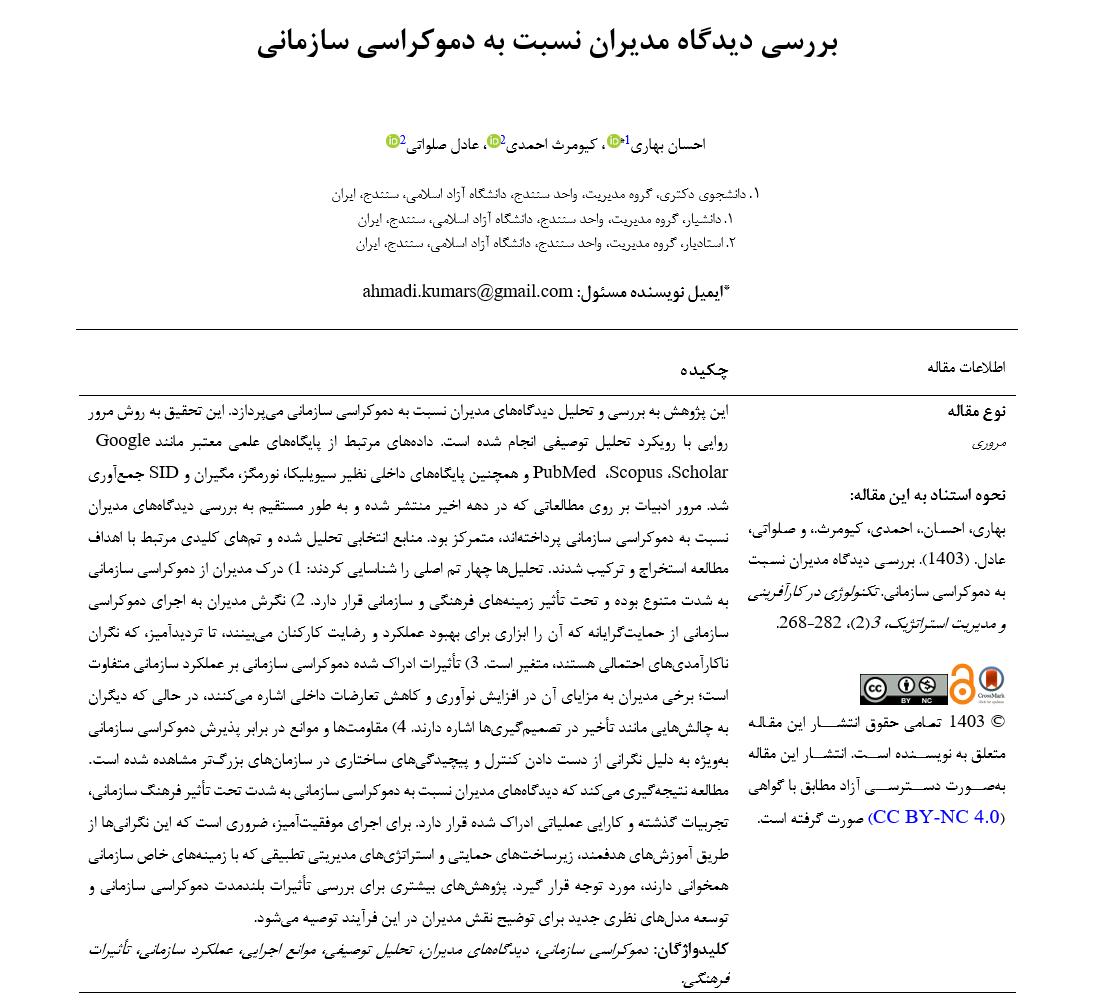بررسی دیدگاه مدیران نسبت به دموکراسی سازمانی
کلمات کلیدی:
دموکراسی سازمانی, دیدگاههای مدیران, تحلیل توصیفی, موانع اجرایی, عملکرد سازمانی, تأثیرات فرهنگیچکیده
این پژوهش به بررسی و تحلیل دیدگاههای مدیران نسبت به دموکراسی سازمانی میپردازد. این تحقیق به روش مرور روایی با رویکرد تحلیل توصیفی انجام شده است. دادههای مرتبط از پایگاههای علمی معتبر مانند Google Scholar، Scopus، PubMed و همچنین پایگاههای داخلی نظیر سیویلیکا، نورمگز، مگیران و SID جمعآوری شد. مرور ادبیات بر روی مطالعاتی که در دهه اخیر منتشر شده و به طور مستقیم به بررسی دیدگاههای مدیران نسبت به دموکراسی سازمانی پرداختهاند، متمرکز بود. منابع انتخابی تحلیل شده و تمهای کلیدی مرتبط با اهداف مطالعه استخراج و ترکیب شدند. تحلیلها چهار تم اصلی را شناسایی کردند: 1) درک مدیران از دموکراسی سازمانی به شدت متنوع بوده و تحت تأثیر زمینههای فرهنگی و سازمانی قرار دارد. 2) نگرش مدیران به اجرای دموکراسی سازمانی از حمایتگرایانه که آن را ابزاری برای بهبود عملکرد و رضایت کارکنان میبینند، تا تردیدآمیز، که نگران ناکارآمدیهای احتمالی هستند، متغیر است. 3) تأثیرات ادراک شده دموکراسی سازمانی بر عملکرد سازمانی متفاوت است؛ برخی مدیران به مزایای آن در افزایش نوآوری و کاهش تعارضات داخلی اشاره میکنند، در حالی که دیگران به چالشهایی مانند تأخیر در تصمیمگیریها اشاره دارند. 4) مقاومتها و موانع در برابر پذیرش دموکراسی سازمانی بهویژه به دلیل نگرانی از دست دادن کنترل و پیچیدگیهای ساختاری در سازمانهای بزرگتر مشاهده شده است. مطالعه نتیجهگیری میکند که دیدگاههای مدیران نسبت به دموکراسی سازمانی به شدت تحت تأثیر فرهنگ سازمانی، تجربیات گذشته و کارایی عملیاتی ادراک شده قرار دارد. برای اجرای موفقیتآمیز، ضروری است که این نگرانیها از طریق آموزشهای هدفمند، زیرساختهای حمایتی و استراتژیهای مدیریتی تطبیقی که با زمینههای خاص سازمانی همخوانی دارند، مورد توجه قرار گیرد. پژوهشهای بیشتری برای بررسی تأثیرات بلندمدت دموکراسی سازمانی و توسعه مدلهای نظری جدید برای توضیح نقش مدیران در این فرآیند توصیه میشود.
دانلودها
مراجع
Ahmed, K., Ahmad, A., Ali, R., & Rehman, R. U. (2019). Organizational Democracy and Employee Outcomes: The
Mediating Role of Organizational Justice. Business Strategy & Development, 2(3), 204-219.
https://doi.org/10.1002/bsd2.55
Barattucci, M., Presti, A. L., Bufalino, G., Jønsson, T., Teresi, M., & Pagliaro, S. (2020). Distributed Leadership Agency
and Work Outcomes: Validation of the Italian DLA and Its Relations With Commitment, Trust, and Satisfaction.
Frontiers in psychology, 11. https://doi.org/10.3389/fpsyg.2020.00512
Barthold, C., Checchi, M., Imas, J. M., & Jones, O. S. (2020). Dissensual Leadership: Rethinking Democratic Leadership
With Jacques Rancière. Organization, 29(4), 673-691. https://doi.org/10.1177/1350508420961529
Berkovich, I. (2023). Teachers' Intrinsic and Extrinsic Motivation as Mediators of the Effect of Principals' Perceived
Distributed Leadership on Organizational Learning Capability. International Journal of Educational Management,
(6/7), 1552-1570. https://doi.org/10.1108/ijem-03-2023-0115
Clarke, M. (2011). Organizational Democracy, Ethics and Leadership: The Mediating Role of Organizational Politics.
Leadership, 7(4), 415-433. https://doi.org/10.1177/1742715011416886
Haskasap, E., Saner, T., Eyupoglu, Ş. Z., & Haskasap, C. S. G. (2022). Influence of Organizational Democracy on
Organizational Citizenship Behaviors in Digital Transformation: Mediating Effects of Job Satisfaction and
Organizational Commitment for Smart Services. Sustainability, 15(1), 452. https://doi.org/10.3390/su15010452
Hielscher, S., Beckmann, M., & Pies, I. (2014). Participation Versus Consent: Should Corporations Be Run According
to Democratic Principles? Business Ethics Quarterly, 24(4), 533-563. https://doi.org/10.5840/beq2014111919
Raelin, J. A. (2012). Dialogue and Deliberation as Expressions of Democratic Leadership in Participatory Organizational
Change. Journal of Organizational Change Management, 25(1), 7-23. https://doi.org/10.1108/09534811211199574
Raelin, J. A. (2014). Imagine There Are No Leaders: Reframing Leadership as Collaborative Agency. Leadership, 12(2),
-2828. https://doi.org/10.1177/1742715014558076
Safari, A., Salehzadeh, R., & Ghaziasgar, E. (2018). Exploring the Antecedents and Consequences of Organizational
Democracy. The TQM Journal, 30(1), 74-96. https://doi.org/10.1108/tqm-05-2017-0057
Wegge, J., Jeppesen, H.-J., & Weber, W. (2012). Broadening Our Perspective: We Leadership Is Both Less Romantic
and More Democratic. Industrial and Organizational Psychology, 5(4), 418-420. https://doi.org/10.1111/j.1754-
2012.01472.x
Wegge, J., Jeppesen, H. J., Weber, W., Pearce, C. L., Silva, S. A. d., Pundt, A., Jønsson, T., Wolf, S., Wassenaar, C. L.,
Unterrainer, C., & Piecha, A. (2010). Promoting Work Motivation in Organizations. Journal of Personnel
Psychology, 9(4), 154-171. https://doi.org/10.1027/1866-5888/a000025

دانلود
چاپ شده
ارسال
بازنگری
پذیرش
شماره
نوع مقاله
مجوز
حق نشر 1403 تکنولوژی در کارآفرینی و مدیریت استراتژیک

این پروژه تحت مجوز بین المللی Creative Commons Attribution-NonCommercial 4.0 می باشد.










